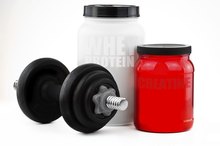Protein Vs. No Protein for a Workout
Amino acids are one of the most important building blocks in muscle growth. Many companies in the fitness industry produce supplements to enhance your daily protein intake before and after you exercise. Timing your protein intake correctly can have significant benefits for your exercise routine depending on the type of exercise and your goals.
Lack of Protein
If you do not consume any protein before or after your workout, you may be contributing to muscle degradation. Every time you run, lift weights or perform muscle straining exercise, your muscle tissue is broken down. In response to this breakdown in muscle tissue, your body sends amino acids and other nutrients to the damaged muscles to facilitate repair and growth. Failure to provide your muscles with any protein before or after you workout can significantly hamper their ability to recover from a workout, particularly if it is intense exercise.
- If you do not consume any protein before or after your workout, you may be contributing to muscle degradation.
Timing of Protein
How Long Should You Wait After a Meal to Drink Muscle Milk?
Learn More
When you consume protein can greatly impact how much it aids in muscle recovery. One 2006 Victoria University study overseen by Paul Cribb found that consuming a protein supplement before and after a workout can improve your strength and muscle quality, compared with taking the same supplement in the morning and at night. After 10 weeks of protein supplementation, subjects that took protein before and after their workouts outperformed the second group in the bench press, squat and deadlift exercises.
Suggested Daily Intake
Although protein is an essential macronutrient that your body needs to recuperate from exercise, it is possible to consume too much in a single day. Excessive protein in your system is likely to be excreted as waste or become stored as fat. Nutritional Supplements in Sports and Exercise by Douglas S. Kalman suggests that you consume somewhere between 1.2 and 1.7 grams per kilogram of body weight per day depending on whether you exercise is for muscular endurance, such as running, or for power, such as heavy weightlifting.
Protein Sources
How Much Protein Per Day if Working Out?
Learn More
Registered dietician Katie James recommends that you try to get all of your daily protein from whole food sources rather than supplements if you can. Foods like nuts, low-fat milk and fish are excellent sources of protein that deliver essential amino acids along with other nutrients your body needs to recover from a workout. Additionally, James states that the average American adult consumes more protein than he needs in his daily diet, so additional supplementation may be unnecessary for you.
Related Articles
References
- Nutritional Supplements in Sports and Exercise; Douglas S. Kalman, MS, RD, CCRC, FA et al
- University of Nebraska: Nutrition: The Competitor's Edge
- Thomas, D. T., Erdman, K. A., & Burke, L. M. (2016). Position of the academy of nutrition and dietetics, dietitians of Canada, and the American College of Sports Medicine: Nutrition and athletic performance. Journal of the Academy of Nutrition and Dietetics, 116(3), 501-528.
- Bauer, J., Biolo, G., Cederholm, T., Cesari, M., Cruz-Jentoft, A. J., Morley, J. E., ... & Visvanathan, R. (2013). Evidence-based recommendations for optimal dietary protein intake in older people: a position paper from the PROT-AGE Study Group. Journal of the American Medical Directors Association, 14(8), 542-559.
- Manninen, A. H. (2004). High-Protein Weight Loss Diets and Purported Adverse Effects: Where is the Evidence? Journal of the International Society of Sports Nutrition, 1(1), 45.
- Halton, T. L., & Hu, F. B. (2004). The effects of high protein diets on thermogenesis, satiety and weight loss: a critical review. Journal of the American College of Nutrition, 23(5), 373-385.
- Pasiakos, S. M., Cao, J. J., Margolis, L. M., Sauter, E. R., Whigham, L. D., McClung, J. P., ... & Young, A. J. (2013). Effects of high-protein diets on fat-free mass and muscle protein synthesis following weight loss: a randomized controlled trial. The FASEB Journal, 27(9), 3837-3847.
- Burd, N. A., van Vliet, S., van Loon, L. J., Beals, J. W., & Paluska, S. A. (2017). Sustained Postprandial Muscle Protein Synthesis Rates after Protein Ingestion in Healthy Young Males. The FASEB Journal, 31(1_supplement), 652-2.
- Mamerow, M. M., Mettler, J. A., English, K. L., Casperson, S. L., Arentson-Lantz, E., Sheffield-Moore, M., ... & Paddon-Jones, D. (2014). Dietary protein distribution positively influences 24-h muscle protein synthesis in healthy adultsâ3. The Journal of Nutrition, 144(6), 876-880.
- Symons, T. B., Sheffield-Moore, M., Wolfe, R. R., & Paddon-Jones, D. (2009). A moderate serving of high-quality protein maximally stimulates skeletal muscle protein synthesis in young and elderly subjects. Journal of the American Dietetic Association, 109(9), 1582-1586.
Writer Bio
Writing professionally since 2005, Ryan Haas specializes in sports, politics and music. His work has appeared in "The Journal-Standard," SKNVibes and trackalerts. Haas holds a Bachelor of Arts in English and creative writing from the University of Illinois.









